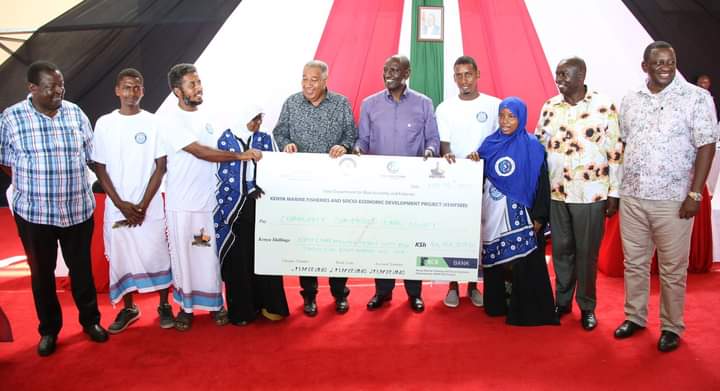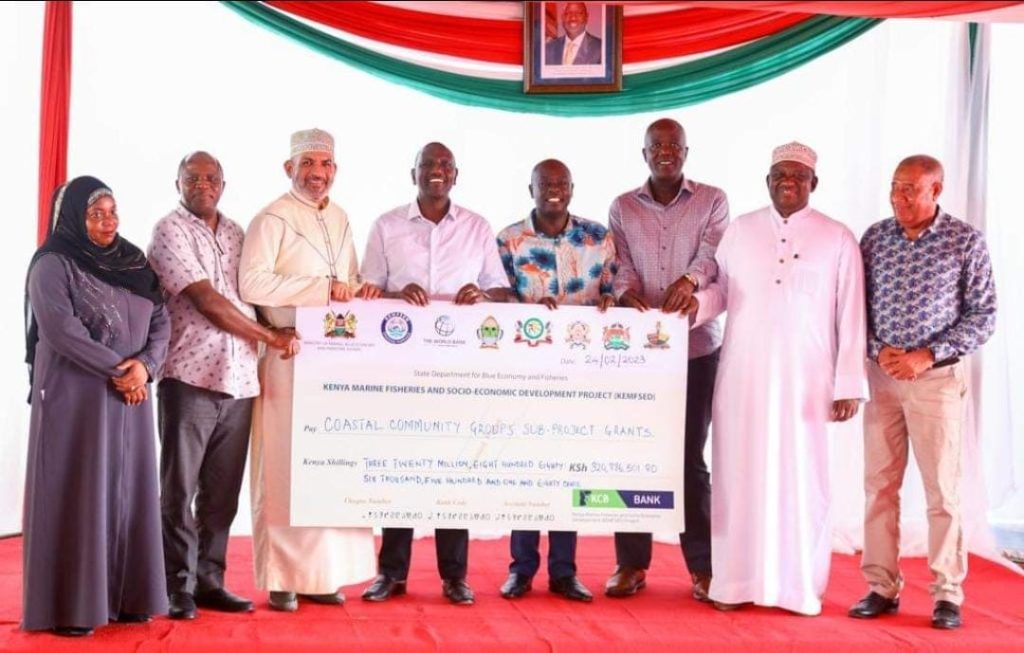

His Excellency President William Ruto presided on February 24th, 2023 over the national launch of the community project grants awarded by the Kenya Marine Fisheries and Socio-Economic Development (KEMFSED) in Mombasa at a ceremony attended by governors of all the five participating counties of Kilifi, Mombasa, Kwale, Tana River and Lamu as well as Mining, Blue Economy and Fisheries Cabinet Secretary Salim Mvurya.
The president presented a cheque for Sh320 million to the governors and community representatives. This is the amount awarded to the 142 groups for community projects across the five counties in the first round of funding. The community projects are expected to benefit about 20,000 people.
The national launch was held at Liwatoni in Mombasa. Among those present were Blue Economy and Fisheries PS Betsy Muthoni, and Fisheries Secretary Lucy Obungu. The KEMFSED team was led by National Coordinator Patrick Kiara. Representatives of the community groups awarded from all five counties also attended.
Later, the President presented the cheque directly to the beneficiaries’ representatives in Lamu during a visit to the county on February 26th.
The KEMFSED grants are distributed as follows: Kilifi Ksh98.9 million for 35 groups, Mombasa Ksh39.3 million for 22 groups, Kwale 100 million to benefit 43 groups, Lamu Ksh48.7 million for 28 groups and Tana River 33.1 million for 14 groups. The beneficiaries are common interest groups spread across 98 focus Wards in 19 sub-counties hosting the highest number of households that are largely dependent on fisheries. The targeted sub-counties include six each in Kilifi and Mombasa, four in Kwale, two in Lamu, and one in Tana River.
The Coastal Community Empowerment and Livelihoods component has been allocated US$41.1 million under the KEMFSED project to be distributed to common interest groups over the project lifespan (2020-2025). Most of the grants (80%) are for productive livelihoods to support the fishers’ access to complementary livelihoods to reduce dependence on fishing in light of the declining catch due to overfishing and climate change, among other challenges.
Community projects complement fisheries
KEMFSED grants are implemented under the Enhanced Livelihoods for Coastal Communities initiative, which is part of Component 2 of the project. The grants are provided to organized Common Interest Groups (CIGs) to which the project has provided technical support to implement sub-projects to complement income from fisheries, improve social welfare and protect the marine environment. These projects include income-generating (livelihood) activities, environmental conservation, and social projects as well as scholarships for students from low-income households.
The grants are awarded to common interest groups (CIGs) that include women’s and youth self-help groups and community-based organizations (CBOs).
Pre-award process: The award of grants follows a rigorous Participatory Integrated Community Development process (PICD) involving a team comprising national government, county governments, community representatives, and other stakeholders. The county-led teams worked with the communities in each of the 98 targeted administrative Wards bordering the Indian Ocean to develop Community Integrated Development Plans (CIDPs). Through this process, the communities identified their own development priorities as well as the interventions that could be funded to address them.
Meetings of the whole community were convened to present and ratify the ward-level CIDPs. These meetings brought together participants from across the community including local leaders, women, youth, occupational groups, people living with disability, the elderly, religious groups, and vulnerable and marginalized groups.
Selection process: The next step in the grant-making involved open invitations to groups to indicate their interest in applying for grants by submitting concept notes for projects in the priority areas identified in the CIDPs. The county technical teams then helped the interested groups to prepare and submit sub-project proposals. A multi-agency, county-led team involving community representatives screened and appraised all the proposals received and conducted on-site visits to verify their eligibility for funding. They also helped worked with technical officers to help the groups improve their proposals. The proposals that met all requirements were then approved for funding.
The community groups whose applications were not successful will be assisted to develop feasible sub-project proposals to be considered in the next round of funding on a rolling basis.
Managing sub-projects
To ensure the effective use of grants and results, group leaders have been trained in leadership and financial management. Additionally, Local Project Management Committees have been formed and trained to oversee the implementation of sub-project activities to ensure accountability including proper use of finances as well transparency and inclusion in the implementation of activities. Grievance Redress Committees (GRM) have also been formed and empowered to ensure any concerns community members raise are addressed.
